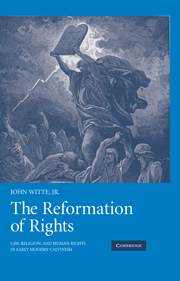Book contents
- Frontmatter
- Contents
- List of illustrations
- Preface and acknowledgments
- List of abbreviations and references
- Introduction
- 1 Moderate (religious) liberty in the theology of John Calvin: The original Genevan experiment
- 2 The duties of conscience and the free exercise of Christian liberty: Theodore Beza and the rise of Calvinist rights and resistance theory
- 3 Natural rights, popular sovereignty, and covenant politics: Johannes Althusius and the Dutch Revolt and Republic
- 4 Prophets, priests, and kings of liberty: John Milton and the rights and liberties of Englishmen
- 5 How to govern a city on a hill: Covenant liberty in Puritan New England
- 6 Concluding reflections: The biography and biology of liberty in early modern Calvinism
- Bibliography
- Index to biblical sources
- Index
1 - Moderate (religious) liberty in the theology of John Calvin: The original Genevan experiment
Published online by Cambridge University Press: 05 February 2015
- Frontmatter
- Contents
- List of illustrations
- Preface and acknowledgments
- List of abbreviations and references
- Introduction
- 1 Moderate (religious) liberty in the theology of John Calvin: The original Genevan experiment
- 2 The duties of conscience and the free exercise of Christian liberty: Theodore Beza and the rise of Calvinist rights and resistance theory
- 3 Natural rights, popular sovereignty, and covenant politics: Johannes Althusius and the Dutch Revolt and Republic
- 4 Prophets, priests, and kings of liberty: John Milton and the rights and liberties of Englishmen
- 5 How to govern a city on a hill: Covenant liberty in Puritan New England
- 6 Concluding reflections: The biography and biology of liberty in early modern Calvinism
- Bibliography
- Index to biblical sources
- Index
Summary
[T]here is no kind of government more salutary than one in which liberty is properly exercised with becoming moderation and properly constituted on a durable basis.
John Calvin, Institutes of the Christian Religion (1543)John Calvin is a controversial candidate for the honor roll of religious liberty in the West. He is at once valorized and villainized both for his theology and for his politics of religious liberty, particularly his participation in the execution of Michael Servetus. Calvin's champions can be found in many quarters. John Adams urged: “Let not Geneva be forgotten or despised. Religious liberty owes it much respect, Servetus notwithstanding.” Jean-Jacques Rousseau, for all his anti-religious sentiment, had only praise for his compatriot: “Those who consider Calvin only as a theologian fail to recognize the breadth of his genius. The editing of our wise laws, in which he had a large share, does him as much credit as his Institutes … [S]o long as the love of country and liberty is not extinct among us, the memory of this great man will be held in reverence.” Charles Borgeaud judged Calvin's Geneva to be “the first stronghold” of religious and political liberty in modern times. Both Emile Doumergue and Walter Köhler described Calvin as the “pioneer of the freedom of conscience and human rights” that were finally constitutionalized after the eighteenth-century American and French Revolutions.
- Type
- Chapter
- Information
- The Reformation of RightsLaw, Religion and Human Rights in Early Modern Calvinism, pp. 39 - 80Publisher: Cambridge University PressPrint publication year: 2008



